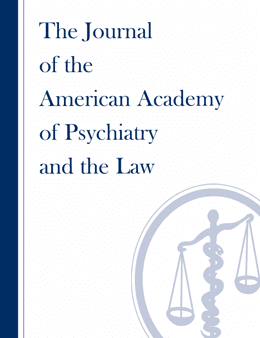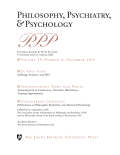
JOURNAL OF THE AMERICAN ACADEMY OF PSYCHIATRY AND THE LAW
Scope & Guideline
Transforming Understanding in Psychiatry and Law
Introduction
Aims and Scopes
- Forensic Psychiatry:
The journal emphasizes forensic psychiatry, exploring the role of mental health professionals in legal settings, including evaluations of competency to stand trial, risk assessments, and the intersection of mental illness with criminal behavior. - Legal and Ethical Considerations:
A core focus of the journal is the legal and ethical implications surrounding psychiatric evaluations, treatment, and civil commitments, addressing issues such as informed consent, capacity evaluations, and the rights of patients. - Interdisciplinary Approaches:
The journal promotes an interdisciplinary perspective, integrating insights from psychology, law, sociology, and ethics to address complex issues related to mental health and the justice system. - Impact of Societal Factors:
Research published in the journal often examines how societal factors, such as race, culture, and gender, influence mental health outcomes and legal processes, highlighting the need for culturally competent practices. - Emerging Trends in Mental Health Law:
The journal addresses current and emerging trends in mental health law, including the implications of technological advancements, such as artificial intelligence, on forensic assessments and legal practices.
Trending and Emerging
- Mental Health and Technology:
There is a growing trend of exploring the intersection of mental health and technology, particularly regarding the implications of artificial intelligence and telepsychiatry in legal contexts. - Social Justice and Mental Health:
Emerging themes include a focus on social justice issues within mental health law, emphasizing the importance of equity, diversity, and inclusion in forensic practice. - Trauma-Informed Approaches:
Recent publications show an increased interest in trauma-informed approaches to forensic evaluations and interventions, recognizing the significance of trauma history in legal contexts. - Crisis Response and Mental Health:
The journal is trending towards discussions on mental health crisis response and the evolving landscape of mental health services, particularly in light of systemic changes post-COVID-19. - Youth and Mental Health Law:
There is a notable increase in research related to youth in the legal system, focusing on juvenile mental health, recidivism, and the effectiveness of mental health courts.
Declining or Waning
- Traditional Diagnostic Categories:
There appears to be a waning emphasis on traditional diagnostic categories in forensic psychiatry, with fewer articles dedicated solely to classic mental health diagnoses and their legal implications. - Historical Perspectives:
Research that delves deeply into historical perspectives of forensic psychiatry has become less frequent, suggesting a shift towards contemporary issues and practical applications rather than retrospective analysis. - General Mental Health Issues:
The journal has seen a decline in articles addressing general mental health issues outside the forensic context, as the focus has shifted more towards specific legal and forensic implications.
Similar Journals

Philosophy Psychiatry & Psychology
Exploring the Mind's Depths: Where Philosophy Meets Mental HealthPhilosophy Psychiatry & Psychology, published by the Johns Hopkins University Press, is a premier scholarly journal dedicated to exploring the rich intersections of philosophy, psychiatry, and psychology. With an ISSN of 1071-6076 and an e-ISSN of 1086-3303, this journal serves as an essential resource for researchers, professionals, and students seeking to deepen their understanding of mental health through a philosophical lens. Acknowledged for its rigor and relevance, the journal has earned Q1 rankings in both Ecology and Philosophy, demonstrating its high impact within the academic community. Additionally, it maintains a notable presence in the Psychiatry and Mental Health category, ranking Q2 in 2023. As such, Philosophy Psychiatry & Psychology is crucial for advancing interdisciplinary dialogue and fostering innovative approaches to contemporary issues at the crossroads of these fields. Although it does not offer open access, the journal ensures comprehensive coverage of its themes from 2011 to 2024, making it a vital platform for archival research and ongoing scholarly conversation.

Psychology and Law
Unlocking the psychological dimensions of legal challenges.Psychology and Law, published by Moscow State Psychological & Pedagogical University, is an open-access journal dedicated to advancing knowledge at the intersection of psychology and legal studies. Since its establishment in 2011, the journal has provided a platform for high-quality research that addresses critical issues in applied, clinical, experimental, cognitive, and social psychology. Despite ranking in the Q4 quartile for various psychology categories in 2023, this journal remains committed to fostering insightful discussions and contributions to the field. Researchers and practitioners from diverse backgrounds are encouraged to explore its accessible content, which aims to enhance our understanding of psychological principles within legal contexts. The journal's ISSN is 2222-5196, and it primarily serves an international audience, promoting scholarly engagement and interdisciplinary collaboration. As the field evolves, Psychology and Law continues to be a vital resource for those seeking to bridge the gap between psychological research and legal practice.

LAW AND HUMAN BEHAVIOR
Illuminating the Nexus of Legal Decisions and Human PsychologyLAW AND HUMAN BEHAVIOR, published by the Educational Publishing Foundation of the American Psychological Association, is a leading interdisciplinary journal that explores the intersection of law and psychology. Established in 1977, this prestigious journal has garnered a reputation for its rigorous scholarly contributions, evidenced by its impressive impact factor and high rankings in various quartiles, including Q1 in both Arts and Humanities and Law in 2023. With its comprehensive scope encompassing critical issues in legal psychology, jury behavior, and the psychological underpinnings of legal decision-making, the journal serves as a vital resource for researchers, professionals, and students alike. Although not an open-access publication, it provides invaluable insights relevant to practitioners and academics focusing on the nuances of human behavior within legal contexts. With ongoing commitment to advancing research through its convergence of psychological and legal discourse, LAW AND HUMAN BEHAVIOR is indispensable for those aiming to bridge the gap between these crucial fields.

BRITISH JOURNAL OF PSYCHIATRY
Fostering Knowledge for a Healthier MindBritish Journal of Psychiatry, published by Cambridge University Press, stands as a pivotal resource in the realm of mental health and psychiatry. With an impressive impact reflected in its Q1 classifications in both Medicine (miscellaneous) and Psychiatry and Mental Health, this esteemed journal ranks 23rd out of 567 in its field according to Scopus, achieving an exceptional 96th percentile. Since its inception in 1963, the journal has continued to push the boundaries of research and discourse, serving as a platform for groundbreaking studies that enhance our understanding of psychiatric conditions and promote effective therapeutic strategies. Though it does not operate with an open-access model, the British Journal of Psychiatry remains an essential publication for researchers, clinicians, and students alike, offering in-depth insights and innovative findings that are crucial for navigating the complexities of mental health.

Rivista di Psichiatria
Cutting-edge Insights into Psychiatry and Mental WellnessRivista di Psichiatria, published by PENSIERO SCIENTIFICO EDITORE, stands as a significant contributor to the field of Psychiatry and Mental Health since its inception in 1975. With an ISSN of 0035-6484 and an E-ISSN of 2038-2502, this esteemed journal offers a platform for rigorous academic discourse and cutting-edge research, helping to shape contemporary psychiatric practices and theories. Currently holding a Q2 designation in Psychiatry and Mental Health based on the 2023 category quartiles, and ranking #197 out of 567 in Scopus, it reflects a commendable 65th percentile among its peers. The journal welcomes contributions that encompass a broad range of topics related to mental health, encouraging contributions from a multidisciplinary approach, which aids in its goal of advancing the understanding and application of psychiatric science. While it is a traditional journal without Open Access options, access to its valuable content can support researchers, clinicians, and students in their pursuit of knowledge and innovation within the field. Situated in Rome, Italy, at VIA SAN GIOVANNI VALDARNO 8, ROME 00138, the journal continues to enhance its rich legacy, promoting the exchange of ideas and fostering collaboration amongst practitioners and scholars alike.

COMPREHENSIVE PSYCHIATRY
Fostering global dialogue on psychiatric advancements.COMPREHENSIVE PSYCHIATRY is a leading peer-reviewed journal dedicated to advancing the field of psychiatry and mental health, published by W B SAUNDERS CO-ELSEVIER INC. With its Q1 designation in both Clinical Psychology and Psychiatry and Mental Health, this journal ranks impressively, holding the 9th position out of 311 in Clinical Psychology and the 27th position out of 567 in Psychiatry and Mental Health according to Scopus metrics. Since transitioning to Open Access in 2019, COMPREHENSIVE PSYCHIATRY has significantly increased its accessibility, enabling a broader audience of researchers, mental health professionals, and students to engage with cutting-edge research and clinical practices. The journal's scope encompasses a wide array of topics, including but not limited to evidence-based interventions, psychological evaluations, and the latest empirical studies in the field. As we continue to navigate the complexities of mental health in contemporary society, this journal serves as a vital resource for disseminating impactful findings and fostering collaborative discourse among scholars and practitioners globally.

ANNALES MEDICO-PSYCHOLOGIQUES
Advancing the Frontiers of Medical PsychologyANNALES MEDICO-PSYCHOLOGIQUES is a distinguished academic journal published by MASSON EDITEUR, focusing on the fields of applied psychology, psychiatry, and related arts and humanities. With its ISSN 0003-4487 and E-ISSN 1769-6631, this journal has been a pivotal platform for researchers since its inception in 1946, contributing valuable insights into the intersection of psychological theory and medical practice. Over the years, it has maintained a significant standing with a Q3 ranking in Applied Psychology and Q2 in Arts and Humanities (Miscellaneous), showcasing its commitment to high-quality research and scholarship. Although it does not operate under an open-access model, the journal remains accessible to researchers and practitioners alike, promoting the dissemination of critical knowledge in mental health and psychological sciences. As evidenced by its Scopus rankings, ANNALES MEDICO-PSYCHOLOGIQUES is recognized for its contributions within the academic community, making it an essential resource for professionals and students aiming to excel in these dynamic fields.

BJPsych Bulletin
Empowering Psychiatry Through Open Access InsightsBJPsych Bulletin, published by Cambridge University Press, stands as a vital resource in the field of Psychiatry and Mental Health, offering open access articles since 2015 to foster widespread dissemination of knowledge. With an ISSN of 2056-4694 and an E-ISSN of 2056-4708, this journal has established an impactful presence, ranking in the Q2 category for Psychiatry and Mental Health in 2023 and placing within the 59th percentile among its peers according to Scopus, which ranks it #229 out of 567 in the category. Covering a diverse range of topics from clinical practices to psychiatric research, the BJPsych Bulletin encourages contributions that explore innovative ideas and discussions around mental health. Its critical role in advancing research and practice in the discipline is complemented by its accessibility to researchers, professionals, and students globally, ensuring that cutting-edge findings reach a broad audience and support the continuous evolution of mental health sciences.

HASTINGS LAW JOURNAL
Fostering Critical Thought in LawThe Hastings Law Journal, published by the University of California, is a distinguished legal academic journal that has been a cornerstone in the field since its inception in 1974. It holds an impressive position in the Scopus rankings, sitting at #239 out of 685 in the Social Sciences - Law category, reflecting a strong 65th percentile. This journal primarily serves as a platform for scholarly discourse on contemporary legal issues, promising to foster critical thought and progressive legal interpretations that resonate within the legal community and beyond. While it does not follow an Open Access model, the Hastings Law Journal remains widely accessible through various academic libraries and databases, ensuring its reach among researchers, practitioners, and students. The journal's commitment to high-quality, peer-reviewed content positions it as an essential resource for those seeking to stay informed about the evolving landscape of law and legal scholarship.

WORLD JOURNAL OF BIOLOGICAL PSYCHIATRY
Unveiling the Biological Foundations of Mental Health.WORLD JOURNAL OF BIOLOGICAL PSYCHIATRY, a premier academic journal published by TAYLOR & FRANCIS LTD, stands at the forefront of interdisciplinary research in the fields of Biological Psychiatry, Psychiatry, and Mental Health. Based in the United Kingdom, this esteemed journal (ISSN: 1562-2975; E-ISSN: 1814-1412) has become increasingly influential since its inception in 2000, with a remarkable impact factor that reflects its high-quality research contributions. The journal is consistently ranked in the Q1 and Q2 categories across various relevant indices, demonstrating its reputation for excellence within the academic community. With Scopus rankings placing it in the top 20th percentile for Psychiatry and Mental Health, the WORLD JOURNAL OF BIOLOGICAL PSYCHIATRY serves as a vital resource for researchers, professionals, and students seeking to further their understanding of the intricate relationship between biological processes and psychiatric phenomena. Despite being a traditional access journal, it possesses a robust scope that encompasses groundbreaking studies, reviews, and advancements in the understanding of mental health disorders, underlining its importance as a key reference in the advancement of psychiatric science and therapeutic practices.